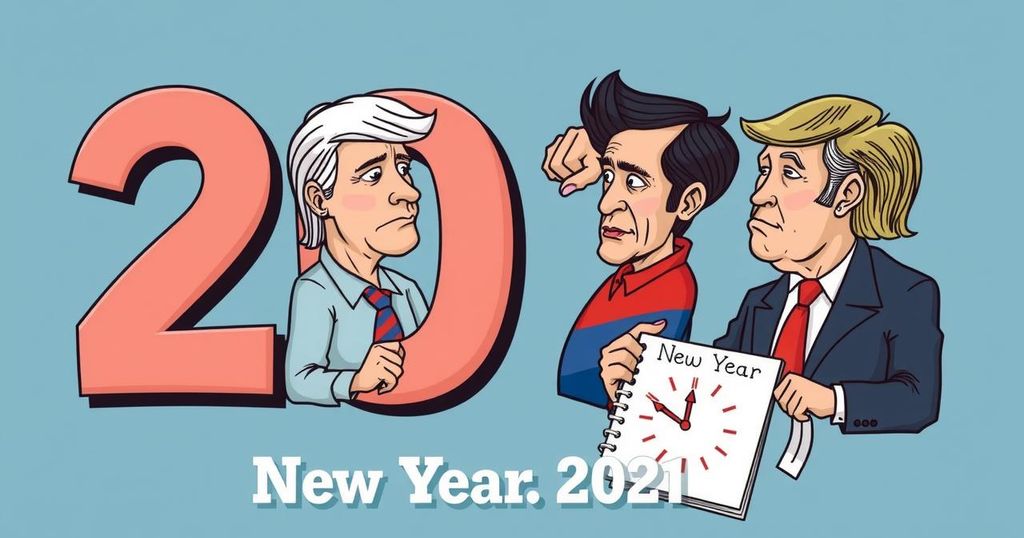Reassessing Our Commitment: The Disillusionment of Elections in 2024

In the wake of 2024’s global elections, it becomes evident that the reliance on electoral processes may undermine democracy rather than nurture it. Despite hopes for positive change, many elections have resulted in the rise of autocracies, violence, and oppression. To enhance genuine democratic engagement, a shift from elections to empowering governance processes is necessary, as posited by experts in civic engagement and democracy.
As we embrace the new year, many people make resolutions that often revolve around personal indulgences or habits. This year, I propose a different approach: let us collectively consider relinquishing our fixation on elections. Beyond the mere act of voting, it is evident that elections have become a counterproductive force in our quest for genuine democratic governance. The year 2024, characterized by its extensive global electoral activities, starkly illustrated this disconnect.
Despite the holding of elections in over seventy countries, it was strikingly clear that they frequently served to entrench autocratic regimes rather than promote democratic principles. Reports indicated that many contests were overshadowed by corruption, intimidation, and violence. Such was the pervasive sentiment that Josh Lerner, Co-Executive Director of People Powered, posited, “Our obsession with elections is killing democracy.” This observation underscores a disheartening but crucial takeaway from 2024: elections are increasingly disempowering and detached from delivering authentic democratic representation.
Research conducted by Freedom House evidenced the troubling nexus between elections and oppression, noting instances where incumberts used electoral processes to hinder their opponents. Violence marred numerous elections, and assertions of victory often led to heightened political strife. This sense of conflict was epitomized by events such as the assault on South Korean opposition figures and the tumultuous political climate in Mexico. The elections of 2024 have notably revealed an emergent phenomenon: the “sore winner,” with ruling parties employing victories to further suppress dissent.
Some observers recognized positive shifts in electoral outcomes, yet these changes frequently resulted in instability rather than hope. Practical implications urge a reconsideration of our strategies. Leonora Camner, Executive Director of Democracy Without Elections, highlighted the need to shift focus toward processes that empower citizen engagement and governance instead of perpetuating a system reliant upon divisive elections.
Furthermore, Matt Leighninger of the National Civic League proposed several actionable reforms including participatory governance mechanisms, civil public discussions, and enhanced community involvement in decision-making. These recommendations provide a pathway toward a more meaningful engagement with democracy that transcends electoral cycles. The primary lesson from the Year of Elections is that, in order to preserve democratic ideals, we must reprioritize our commitment from elections to democratic processes themselves. Let us consider a future where democracy is defined not merely by voting, but by genuine participation and empowerment of the populace.
The phenomenon of elections around the globe presents a complex relationship between democratic ideals and the realities of governance. The year 2024 witnessed a significant number of elections across over seventy nations, prompting widespread expectations for progress in democracy. Contrarily, these electoral events predominantly reinforced authoritarian regimes, engendering violence and disillusionment among citizens. The call to reassess our relationship with elections argues for a transition toward more empowering democratic practices.
In conclusion, the 2024 election year has illuminated critical deficiencies within the electoral processes as means of achieving true democracy. The experiences from this year exhibit a troubling trend: elections often serve to undermine democratic governance rather than enhance it. Moving forward, it is imperative that we shift our focus from elections to fostering mechanisms that promote the empowerment of citizens and community engagement, ensuring that democracy is entrenched in the governance framework.
Original Source: www.vcstar.com








